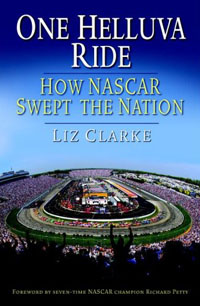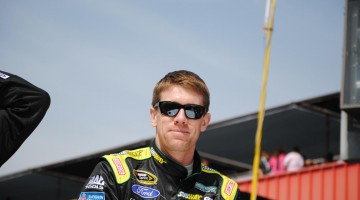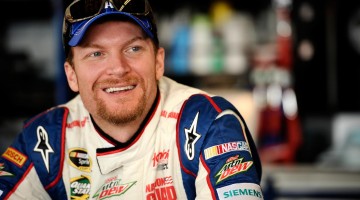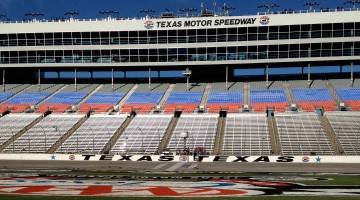 A couple months ago I was given the opportunity to read Washington Post writer Liz Clarke’s new book about NASCAR entitled “One Helluva Ride: How NASCAR Swept the Nation.” I mentioned once before, when I was close to finishing the book, how emotional it made me feel. If you’re new to NASCAR or have been a fan for all of your life you should definitely pick up One Helluva Ride. It gives great insight, from one reporter’s unique perspective, on how NASCAR began and evolved over the years.
A couple months ago I was given the opportunity to read Washington Post writer Liz Clarke’s new book about NASCAR entitled “One Helluva Ride: How NASCAR Swept the Nation.” I mentioned once before, when I was close to finishing the book, how emotional it made me feel. If you’re new to NASCAR or have been a fan for all of your life you should definitely pick up One Helluva Ride. It gives great insight, from one reporter’s unique perspective, on how NASCAR began and evolved over the years.
Luckily for me I was also given the opportunity to speak with Liz about the book and ask her some questions. I’m posting the results of our conversation here and in subsequent posts. Enjoy!
:: This is part one in a series of four posts (to see all of the posts on one page, click here) ::
Me: Why did you want to write the book and how did it come about?
Liz: I think that my experience was different than a lot of peoples in that I was approached by an editor, a book editor who was familiar with my work at the Post and asked if I had ever thought about writing a book. She suggested one on gymnastics or tennis, which I was also covering at the time. She emailed and I said I’d love to write a book, I’ve never written a book but if I wrote one I really would feel more comfortable writing one about NASCAR. That’s the sport I know the best and would probably have the most to say and I thought she might go running, ya know fleeing and hanging up, I didn’t know how this would go over but she was open minded. She said “Well I’ll listen to that.” So that forced me to give some discipline to what was the book that I had in mind, I mean what is it that I wanted to say about NASCAR. Ya know and put that in written form, and do a proposal. Ya know one option would have been to focus on one driver’s story. Or to focus on a season in the life of the sport and I really wasn’t drawn to do either one.
I looked at this as the only book that I would ever write in my lifetime and I wanted sort of to say everything, just like say everything that I knew that I felt most strongly about and that there never was room for in a newspaper story or you edit your own self and you think “Well that’s not appropriate for a newspaper story, nobody really cares what I think, or nobody really cares about this funny conversation I had with so and so.” It’s invariably when you talk to people and they know you cover sports the questions they ask you are often the stories you never write, like “What is that person really like?” “What is Bill Elliott like?” or “What is Dale Earnhardt really like?” It’s odd how you never write those stories.
Also I was acutely aware of how rapidly the sport was growing and changing in obvious ways, the closing of several small tracks, the move west to new markets but also the change in the basic driver. The drivers were getting younger, they were from all over the country, they had a certain polish, ya know PR training was new and ya know some of this is easy to admire NASCAR for and really applaud their growth. Some of it made me sad. And so I just felt this overwhelming need to capture all of this before it kind of went away, before it was lost forever. And my, I hope this is not to vague, but my idea was to start the book in 1992 with the first night race at Charlotte. It was the first night race I recall seeing in person when it just knocked my socks off. And then I talked to some smart people and they said “No, no, no, you have to start where the sport starts. You have to start in the dirt.” And I thought “Oh god that’s going to bore people, I won’t get them through that to get to the part that I know.” But I think that was right.
I tried to cover a ton of history really in a compressed way and ya know certainly the book doesn’t stand up as this definitive history of NASCAR. I mean, I skip tons of champions. I ignore big chunks of the sport’s history but it was my version of the sport’s history in that it was to me what was important. To me what was important was the individualism of the people who ran moonshine and then raced stock cars, and the power of Bill France Jr., the unbelievable power that he had, and the warmth of Richard Petty. To me those are the three themes of the first thirty years of stock car racing. So I took some liberties in focusing on that.
Me: Which I think is really great because when people ask you “why do you like NASCAR?” It’s hard to say, because everyone always says “isn’t it just them driving around in circles?” And I’m like, “It’s so much more than that.” It really is the personalities of the drivers that make it so interesting and figuring who your favorite is based off of personality traits or how they interact with the other drivers.
Liz: Yes, I totally agree. And so, I can certainly understand why people change the channel as fast as they can when they see it. If you can’ tell, if you don’t know who’s in the cars, it is just kind of cars going around. It’s hard to explain to people that the people stand for something and that fans feel this connection.
Me: That’s what I liked about Richard Petty’s introduction in your book, which I thought was really cool that you got The King to write an introduction to your book. That’s awesome.
Liz: Oh, I was honored. I was so honored. So you liked that?
Me: Yea, and I liked how he said that if you’ve never been to a NASCAR race you should just go and then, ya know, you watch the cars, pick one out that you’re going to focus on for the race. And then as you keep watching you’ll learn more and then you’ll figure out ok, maybe I want this other driver, and you’ll figure out which one you like and then it can grow into something more. You have to kind of just pick one and go with it. Which is really true, that’s what I did. I started out with Dale Earnhardt Jr. and then I found out about all of these other drivers. I was like “Hey, Carl Edwards is really cool,” and I like the way he handles himself. You broaden your horizons as you keep watching. So, speaking of personalities, do you think that there is less personality in the drivers or different characters? Or do you think it’s about the same?
Liz: Based on what we can see as viewers, whether you’re watching on TV or listening on the scanners whatever, to me there’s definitely less personality. I’m not convinced the drivers themselves are less interesting, but there latitude for expressing themselves is so narrow now, they’re so scrutinized, ya know primarily by their sponsors who are paying the bills. They have to be the corporate pitchman all the time. Ya know, NASCAR probably gets and probably deserves some criticism for muzzling drivers’ personalities, with being very quick to fine and penalize for expressions. I mean, the one that just rankled me to death was when Dale Jr. was so excited after the win at Talladega. Ya know the “it don’t mean shit because my daddy won here ten times” or something. And ya know that use of “shit” wasn’t offensive. The vernacular [was used as a] huge compliment to his dad.
Me: Yea, that got me too. It was like, the moment he said it, it didn’t even phase me, you’re just so happy for him you’re not thinking about what he’s saying. Not the word he used at that particular moment.
Liz: Exactly. Yea, because the whole spirit was: I’m nothing compared to my dad. I mean what a great thing to say. He is something, he is emerging. But it was just a great tribute and a great moment and it was so dour and lame of NASCAR to react to that. I just wish the drivers words and behaviors after winning were not so scripted. I mean I understand corporate money makes the sport go and that these people are in the sport not only because their logo is seen but because their company logo is said by the driver. But I would find any driver who wins a race and gets out of the car and mentions his sponsor before he expresses one authentic emotion. I mean lets have the emotion and then, ya now, fulfill your contract. It’s a long way of saying I don’t think the drivers are boring personalities and you can’t find an interesting guy in the garage with an interesting opinion. I just think they’re almost in a straight jacket about how they behave, whether it’s all the, what are those Gillette drivers? What are they called? (Me: The Young Guns) Yea, Whether it’s all the Young Guns have to shave, ya know. Certainly decorum is called for but ya know and also the whole thing about being fearful of criticizing NASCAR or even questioning NASCAR. I was elated when Dale Jr. said on Sunday this track wasn’t ready to race; it was not a good move. Now that’s perceived as criticizing NASCAR. To me that’s a totally legitimate comment by a guy who was in the car and just got wiped out. I can’t believe more drivers didn’t say the same thing. I was thrilled that Denny Hamlin said it. To me it just bothered me to death that the broadcasters were not already discussing this on TV. Ya know, is this a good decision? You can talk about issues in the sport without slamming NASCAR.
Ya know but people, there’s this culture of you can’t question the Car of Tomorrow, you can’t question any, the length of the races, you can’t question the timing of the starts, ya know, whatever. The sport would be better, I mean Kyle Petty can do it, he can do it.
Me: Do you think there’s a fear amongst the drivers of retaliation from NASCAR? Is there a real, valid fear that if I say something they’re going to dock me points?
Liz: I think that that specter certainly was very palpable when I started covering this sport 15 years ago, 10 years ago. That was a real fear because there was so much more grey area in the application of the rule book. Getting through inspection was a real black box, I mean no one really knew quite what it took. And now I mean under Robin Pemberton and Gary Nelson before him, NASCAR has gotten quite specific and quite literal about what it takes to get through inspection, so there’s not that murkiness. It’s more above board; it’s more on the up and up. But that said, there’s still this vestige I think in the culture of, ya know, this is one man’s sport and he makes the rules and we can play by his rules or leave. That’s the way Bill France built it. It’s not so much the way they run it now but it has, that effect is still in the air.



